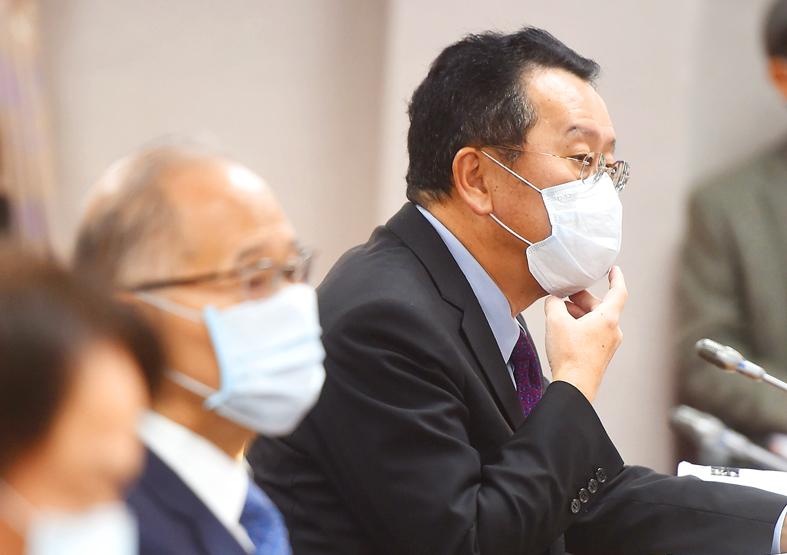The National Security Council (NSC) is to bolster information security by strengthening its joint national-level security structure over the next year, establishing a data-driven proactive defense system, and securing the nation’s data channels and supply chains, NSC Secretary-General Wellington Koo (顧立雄) said yesterday.
Koo unveiled the three goals while reporting national defense budget plans for next year to the Legislative Yuan’s Judiciary and Organic Laws and Statutes Committee.
The council has five main priorities for the coming year, he said.

Photo: Chien Jung-fong, Taipei Times
First, it would accelerate development of Taiwan’s asymmetric combat capabilities, bolster the reserve system and improve management of the nation’s armed forces, he said.
Second, it would defend the nation’s sovereignty and regional stability by promoting diplomatic relationships and substantive participation in the international community, he said.
Third, it would maintain peace and stability in the Taiwan Strait by understanding internal and external changes that might affect the current status, Koo said.
Fourth, it would enhance the capabilities and resilience of the homeland security system to more effectively respond to threats such as natural disasters and terrorist attacks, he said.
Fifth, the council would improve its “information and national security strategy 2.0” by implementing a proactive defense system to create a resilient and secure “smart nation,” Koo added.
Information security is of paramount importance in nearly every segment of society, but it faces threats that increase by the day, Koo said.
In responding to the threats, the council would focus on three priorities, he said.
First, the NSC would focus on upgrading the national-level joint defense system and the team focused on information security, he said.
Second, the council would work with its partners in the public sector and abroad to establish a data-driven proactive defense mechanism, he said.
Third, it would promote information security within industry, and support cybersecurity firms to enhance the nation’s independence and capabilities in the field, he added.
The council ultimately hopes to enable “early warning, emergency response and continuous operations,” and become the world’s trusted source for secure systems and supply chains, Koo said.
This way, Taiwan could secure its cyberspace and critical infrastructure from attacks, he said.

SHIPS, TRAINS AND AUTOMOBILES: The ministry has announced changes to varied transportation industries taking effect soon, with a number of effects for passengers Beginning next month, the post office is canceling signature upon delivery and written inquiry services for international registered small packets in accordance with the new policy of the Universal Postal Union, the Ministry of Transportation and Communications said yesterday. The new policy does not apply to packets that are to be delivered to China, the ministry said. Senders of international registered small packets would receive a NT$10 rebate on postage if the packets are sent from Jan. 1 to March 31, it added. The ministry said that three other policies are also scheduled to take effect next month. International cruise ship operators

HORROR STORIES: One victim recounted not realizing they had been stabbed and seeing people bleeding, while another recalled breaking down in tears after fleeing A man on Friday died after he tried to fight the knife-wielding suspect who went on a stabbing spree near two of Taipei’s busiest metro stations, Taipei Mayor Chiang Wan-an (蔣萬安) said. The 57-year-old man, identified by his family name, Yu (余), encountered the suspect at Exit M7 of Taipei Main Station and immediately tried to stop him, but was fatally wounded and later died, Chiang said, calling the incident “heartbreaking.” Yu’s family would receive at least NT$5 million (US$158,584) in compensation through the Taipei Rapid Transit Corp’s (TRTC) insurance coverage, he said after convening an emergency security response meeting yesterday morning. National

PLANNED: The suspect visited the crime scene before the killings, seeking information on how to access the roof, and had extensively researched a 2014 stabbing incident The suspect in a stabbing attack that killed three people and injured 11 in Taipei on Friday had planned the assault and set fires at other locations earlier in the day, law enforcement officials said yesterday. National Police Agency (NPA) Director-General Chang Jung-hsin (張榮興) said the suspect, a 27-year-old man named Chang Wen (張文), began the attacks at 3:40pm, first setting off smoke bombs on a road, damaging cars and motorbikes. Earlier, Chang Wen set fire to a rental room where he was staying on Gongyuan Road in Zhongzheng District (中正), Chang Jung-hsin said. The suspect later threw smoke grenades near two exits

The Forestry and Nature Conservation Agency yesterday launched a gift box to market honey “certified by a Formosan black bear” in appreciation of a beekeeper’s amicable interaction with a honey-thieving bear. Beekeeper Chih Ming-chen (池明鎮) in January inspected his bee farm in Hualien County’s Jhuosi Township (卓溪) and found that more than 20 beehives had been destroyed and many hives were eaten, with bear droppings and paw prints near the destroyed hives, the agency said. Chih returned to the farm to move the remaining beehives away that evening when he encountered a Formosan black bear only 20m away, the agency said. The bear